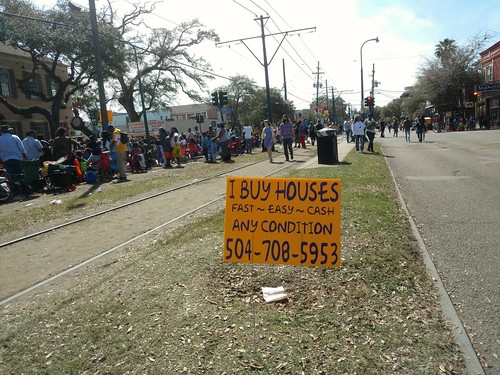Michael Bagneris won what Tyler Bridges is calling the "Frank Stewart Primary."
Michael Bagneris has won the Frank Stewart primary, and that could
pay dividends for a New Orleans mayoral candidate who has lagged in the
polls and in raising money.
Stewart, who built a nationwide
funeral home and cemetery business that was sold in 2013, is not only
supporting Bagneris but also organized a breakfast for the former judge
last week with some three dozen friends and associates capable of
writing big campaign checks.
“My candidate knocked the socks off
all 38 people,” Stewart said Wednesday. “They all said he was so
impressive that they would support him. I was overwhelmed.”
Stewart's profile in New Orleans politics got a lift earlier this year
after he published full-page newspaper ads denouncing Mayor Mitch
Landrieu and his decision to push for the removal of four Jim Crow-era
monuments, including the statue of Robert E. Lee at Lee Circle
I wonder does this mean we have to ask Bagneris about the monuments now? Actually, wait, we did do this. Or
at least Bridges did in an earlier article.
Michael Bagneris, a former Civil District Court judge, lamented that
the debate over whether to take down the monuments “divides the races.”
He said Landrieu should have put the decision to the city’s voters.
“Everybody
would have had a chance to express their view,” he said. “Whichever way
it would have come down, people would have been satisfied.”
Bagneris declined to say how he would have voted.
Asked
for a clarification of his views, he chose to have a spokesman issue a
written statement. “At this time,” it said, “there is nothing further to
say on the subject as it distracts from the real issue facing our city:
solving the violent crime problem.”
Tut tut at the "divisiveness," fail to take a stand on the issue, and go full bore into "Murders Not Monuments." That's some bold leadership right there. No wonder Stewart and friends are impressed. They also like a guy who isn't here to coddle the damn kids today.
Besides Stewart, Jay Lapeyre, another prominent New Orleans
businessman, hosted a meet-and-greet with Bagneris at his Uptown home on
Aug. 3 with about 20 friends. Lapeyre said that afterward he decided to
support Bagneris and contributed the maximum $5,000.
“Michael has
the personal accomplishments needed to understand how important it is
to create opportunities that are aspirational for other people,” said
Lapeyre, who runs a major manufacturing company and has headed powerful
business associations such as the Business Council of New Orleans. “You
can’t think it’s just about what do we need to do to make it more
comfortable. It’s about how to challenge people, especially young
people.”
Geeze.
Meanwhile, here is
Peter Athas's debut column at the Bayou Brief. It's a brief summary of some recent mayoral elections with some good commentary on the candidates and their coalitions. I'm not 100 percent in agreement with Peter's characterization of certain people and events but it's a very worthwhile piece.
I've been looking specifically at 2002 as a comparable scenario to this election for a few months now. Peter seems to agree with that.
There were two frontrunners at the start of the 2002 campaign: State
Sen. Paulette Irons and Marc Morial’s respected police chief, Richard
Pennington. Irons’ well-financed bid to be the city’s first female mayor
fell apart because of a somewhat casual acquaintance with the truth, as pointed out by the Gambit‘s Allen Johnson in a piece entitled “The Perils of Paulette.”
Irons was also the subject of an intense opposition campaign. As to the
late Chief Pennington, he was a great cop, a nice man, and a terrible
politician. His biggest mistake was allowing Dollar Bill Jefferson’s
organization to run his campaign. White voters still took a dim view of
the Congressman in 2002, and with good reason. His friends and relations
spent the aughties looting the school board. Dollar Bill’s finger in
the Pennington pie meant that the man who should have been the perfect
racial cross-over candidate was viewed with suspicion by white
conservatives and goo-goo reformer types alike. It didn’t matter that
he’d reduced crime dramatically and cleaned up a corrupt department.
Palling around with Dollar Bill killed his chances.
Typically, New Orleans mayoral elections end up being less about individual candidates and platforms and more about the interest groups and power player who coalesce behind the campaigns. In a year like this year, when none of the candidates is a dominant personality, the behind the scenes jockeying becomes even more important. Broadly speaking, though, the pattern tends toward a struggle between two broadly defined power bases. And, yes, those broad bases have a lot to do with race. There's always a "black" candidate and a "white" candidate regardless of the actual races of the individuals.
To explain this a little, let's look back at
this (rather hostile) Advocate article from a few weeks ago about Desiree Charbonnet's donors. The article points out, as most people will, that Desiree is pulling in a large share of the donations from contractors who do business with the city. That's worth raising an eyebrow at. But it is also true that these firms always put money into elections and that they do this because they believe it's a way to remain in good standing with the winners. (Notice a lot of them are hedging their bets by dropping Cantrell a little money as well.) Still, yes, there is a pay-to-play aspect to this even if it is merely implicit. And, yes, this is quite obviously an inherent and pervasive problem not only in local New Orleans politics but in.. you know... politics everywhere you go.
Charbonnet was always going to be the primary beneficiary of this from the moment she got into the race. The reasons for this have to do with her family name, and her institutional connection to a system of political organizing and patronage. This system can justifiably be criticized for the climate of petty corruption and insider dealing it tends to engender. But keep in mind that it has also played a significant role in achieving some semblance of racial and economic parity in a city where the levers of power and influence were traditionally reserved for an insular class of white plutocrats.
So to bring this back to 2002, Pennington at that time, ran with basically the backing Charbonnnet has now. It's more complicated than just that. But it was generally understood to be a continuance of the Morial administration and so everyone who was benefiting there would naturally want to stay the course. Pennington was opposed by Ray Nagin who had the support of the "business community" such as the cabal of tech bros who founded Idea Village as well as the philanthropic clubs and old line Carnival types. "Goo-goo reformers and white conservatives" aren't always in the exact same camp but they do tend to find each other during mayoral elections. When the runoff comes, they will almost certainly be on the same side.
Right now, though, the white vote is pretty loose and all three major candidates are scrambling to nail down what bits of it they can. It looks right now like a the "goo-goo" side which I would define as middle class white liberals are still kicking the tires on LaToya while the plutocrats haven't been fully accounted for. That is, until Bagneris started picking up a few of them this week.
Anyway, I hope all of this helps put this last quote from Bridges's article into context. It's about where the players are lining up.. or at least where Bagneris would like them to.
Asked if he made any promises to the businessmen at Stewart’s
gathering, Bagneris said, “What promise would you give to any of the
individuals? They are already independently wealthy. These are not
contractors who need a city contract.”
Charbonnet, who had
$645,000 in hand through mid-July, compared to Bagneris’ $180,000, has
been criticized for taking numerous $5,000 contributions from city
contractors.




